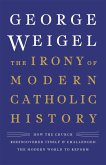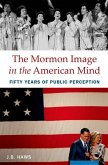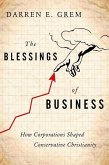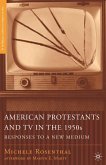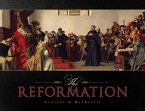In the first comprehensive history of American evangelicalism to appear in a generation, Matthew Sutton shows how charismatic Protestant preachers, anticipating the end of the world, paradoxically transformed it. Narrating the story from the perspective of the faithful, he shows how apocalyptic thinking influences the American mainstream today.
Matthew Avery Sutton read just about everything that fundamentalists and evangelicals had to offer in preparation for his pointed argument in American Apocalypse: premillennial dispensationalism pushed conservative Protestants into public, political, national, and international action. If you want to wrestle with evangelicals, read this book.
-- Edward J. Blum Christian Century
Gives us our first good account of how and why evangelical political views developed the way they did.
-- Michael S. Hamilton Christian Century
In this sweeping history, Sutton (a historian and biographer of Pentecostal evangelist Aimee Semple McPherson) argues that apocalyptic fervor exercised an underappreciated influence on believers, churches, and institutions, helping to propel the evangelical resurgence after World War II and continuing to shape the movement ever since.
-- Matt Reynolds Christianity Today
An important story, and it is exceedingly well told.
-- Christopher McConnell Booklist
[A] valuable account of American premillennial evangelicalism... Sutton provides a wealth of documentation on premillennialists' prophetic speculation, self-presentation, and increasing importance over the last century.
-- Steve Young Library Journal
[Sutton] challenges the now-accepted accounts of Christian fundamentalism that attribute its rise to conflicts with evolution and modernist theories of biblical interpretation. Rather, he argues in this elegant, judicious, and thoughtful new history, apocalypticism-or the belief in an imminent end of the world-shaped the development of fundamentalism and sustained it through generations, from the late nineteenth-century to the present day. Thus, he contends, the anticipated end-of-the-world provided an interpretation of natural disasters, geopolitical changes, and war... He deftly weaves this idea through political events from the New Deal through the Cold War and into fundamentalist response to 9/11, and he illustrates the singular power of individuals ranging from Charles Fuller and Billy Sunday to Billy Graham and Hal Lindsey to influence fundamentalist Christians to political action. Sutton's engaging book belongs next to classic texts on the subject.
-- Publishers Weekly
Sutton's ambitious book refocuses the history of twentieth-century evangelicalism on apocalypticism, offering a vivid account of how preoccupation with the end times provided the conceptual framework for evangelical political activism and stoked its emotional fervor. American Apocalypse shows brilliantly how a terror of impending doom was translated into politics on issues ranging from support for Israel to anti-abortion activism.
-- Robert A. Orsi, author of Thank You, St. Jude and The Madonna of 115th Street
American Apocalypse will quickly become the definitive general account of evangelicalism's spectacular growth as a political and cultural force in the twentieth century. It is a brilliant book, sophisticated and compelling yet also lively and entertaining. With religion continuing to play a major role in American politics and culture, American Apocalypse is a must-read that will shed new light on the nation's past, present, and future.
-- Andrew Preston, author of Sword of the Spirit, Shield of Faith: Religion in American War and Diplomacy
American Apocalypse is a work of impressive erudition as well as a work of beauty. Arguing for the centrality in the American evangelical tradition of ideas about how the world will end, Sutton embeds the narrative in twentieth-century U.S. and international political history in a way that few American religious historians have been able to do.
-- Grant Wacker, author of America's Pastor: Billy Graham and the Shaping of a Nation
American Apocalypse relentlessly and impressively shows how evangelicals have interpreted almost every domestic or international crisis in relation to Christ's return and his judgment upon the wicked...Sutton sees one of the most troubling aspects of evangelical influence in the spread of the apocalyptic outlook among Republican politicians with the rise of the Religious Right...American Apocalypse clearly shows just how popular evangelical apocalypticism has been and, during the Cold War, how the combination of odd belief and political power could produce a sleepless night or two.
-- D. G. Hart Wall Street Journal
Sutton [has] written [an] important book that deserve to be read by anyone seeking to understand not only American church history but contemporary American culture and politics.
-- Paul Richardson Church of England Newspaper
Fascinating... Sutton has produced one of those rare books that is both academically rigorous and a very good read... Sutton explains how radical evangelical Christianity became associated with free market economics, an association now so established in the U.S. that it is difficult to imagine it could ever have been otherwise. He elucidates both how reliance on funding from wealthy business people has had a lot to do with this and how the theology led to it. The predominant view among pre-millennialists has always been that since the world is about to end there is no point in trying to improve it...The defining episode in the political orientation of the movement was the election of F. D. Roosevelt as president on a platform of extensive government intervention in the economy that seemed to most evangelical Christians far too similar to the atheistic communism of the USSR. Opposition to the New Deal became a rallying point of the movement, and indeed one of its most outspoken preachers came close to identifying FDR as the Anti-Christ. (The reader comes away from this book marvelling at the ability of believers in prophecy to perceive the Anti-Christ in just about anything or anybody.) Since then this type of American Christianity has become inextricably linked with opposition to big government, high taxes and trade unionism. Though, as Sutton points out, such people have never seen any contradiction in demanding that the government intervene vigorously in the private lives of its citizens, along the moral lines of which they approve...A central strength of the book is its careful analysis of racial differences and limitations within the radical evangelical movement. It was always dominated by white men and the racial divisions that became entrenched in the early part of the twentieth century are still present today.
-- Elaine Housby LSE Review of Books
Sutton presents modern evangelicalism mainly through its most formidable preachers, the men who took full advantage of the media, especially radio and television when they became available, and books till then...Sutton brings to these strange episodes of American culture a proper degree of attentiveness and patience, with only a rare glint of irony breaking through.
-- Denis Donoghue Irish Times
It is to the great credit of Matthew Avery Sutton, an American historian who has spent the past seven years 'thinking about the end of the world,' that we now have a concise, convincing and eminently readable account of the rise of the U.S. evangelical movement...In American Apocalypse, Sutton traces its improbably spread. It is a disquieting story filled with outrageous characters [and] jarring beliefs...[A] valuable, timely and often entertaining account.
-- Tony Allen-Mills Sunday Times
Sutton is interested in Christian apocalypticism not as a fringe movement but as a political and cultural force that transformed America...Sutton's book demonstrates that the history of evangelicalism, cynical and fatalistic as it may be, is very much our own.
-- Meghan O'Gieblyn Boston Review
Sutton stitches together prophecy and politics in a compelling and original manner, adding a rich layer of original research...The result is a rich, amusing, and often sobering glimpse into the sometimes dark passions of American premillennialism.
-- John G. Turner Books & Culture
From the First World War through Cold War isolationism to the current culture wars, Sutton has charted the way radical evangelical beliefs in a premillennial return of Christ have influenced and been influenced by global events and American political culture. In this way, he serves students of history and religion seeking to reflect upon the social and political contribution of evangelical faith.
-- James Church Reform
This history of the modern American evangelical movement argues that, for more than a century, its members have simultaneously embraced end-time prophecy-interpreting world events as 'signs' of Jesus' imminent return-and politics. The apparent paradox in this 'engaged premillennialism' (why bother with Congress if the rapture is near?) was, Sutton writes, answered with the Biblical injunction to 'occupy' the world while waiting. Almost from the beginning, this meant support for conservative positions and for Israel. The history Sutton assembles is rich, and the connections are startling.
-- New Yorker
American Apocalypse is the best history of American evangelicalism I've read in some time. Sutton strews his chronicle with little pleasures...If you want to understand why compromise has become a dirty word in the GOP today and how cultural politics is splitting the nation apart, American Apocalypse is an excellent place to start.
-- Stephen Prothero Bookforum
[Sutton] trains his discerning eye on the rise of ardent prophecy belief in twentieth-century America. He's able to render his subject in fresh and arresting light by deliberately abjuring the well-worn catechisms of the culture wars.
-- Chris Lehmann Raritan
Sutton tells this story well. His key achievement is that he sticks to his brief, of showing that premillennialism has been central to modern Evangelicalism, and avoids narrating every aspect of the culture wars.
-- Theo Hobson Times Literary Supplement
-- Edward J. Blum Christian Century
Gives us our first good account of how and why evangelical political views developed the way they did.
-- Michael S. Hamilton Christian Century
In this sweeping history, Sutton (a historian and biographer of Pentecostal evangelist Aimee Semple McPherson) argues that apocalyptic fervor exercised an underappreciated influence on believers, churches, and institutions, helping to propel the evangelical resurgence after World War II and continuing to shape the movement ever since.
-- Matt Reynolds Christianity Today
An important story, and it is exceedingly well told.
-- Christopher McConnell Booklist
[A] valuable account of American premillennial evangelicalism... Sutton provides a wealth of documentation on premillennialists' prophetic speculation, self-presentation, and increasing importance over the last century.
-- Steve Young Library Journal
[Sutton] challenges the now-accepted accounts of Christian fundamentalism that attribute its rise to conflicts with evolution and modernist theories of biblical interpretation. Rather, he argues in this elegant, judicious, and thoughtful new history, apocalypticism-or the belief in an imminent end of the world-shaped the development of fundamentalism and sustained it through generations, from the late nineteenth-century to the present day. Thus, he contends, the anticipated end-of-the-world provided an interpretation of natural disasters, geopolitical changes, and war... He deftly weaves this idea through political events from the New Deal through the Cold War and into fundamentalist response to 9/11, and he illustrates the singular power of individuals ranging from Charles Fuller and Billy Sunday to Billy Graham and Hal Lindsey to influence fundamentalist Christians to political action. Sutton's engaging book belongs next to classic texts on the subject.
-- Publishers Weekly
Sutton's ambitious book refocuses the history of twentieth-century evangelicalism on apocalypticism, offering a vivid account of how preoccupation with the end times provided the conceptual framework for evangelical political activism and stoked its emotional fervor. American Apocalypse shows brilliantly how a terror of impending doom was translated into politics on issues ranging from support for Israel to anti-abortion activism.
-- Robert A. Orsi, author of Thank You, St. Jude and The Madonna of 115th Street
American Apocalypse will quickly become the definitive general account of evangelicalism's spectacular growth as a political and cultural force in the twentieth century. It is a brilliant book, sophisticated and compelling yet also lively and entertaining. With religion continuing to play a major role in American politics and culture, American Apocalypse is a must-read that will shed new light on the nation's past, present, and future.
-- Andrew Preston, author of Sword of the Spirit, Shield of Faith: Religion in American War and Diplomacy
American Apocalypse is a work of impressive erudition as well as a work of beauty. Arguing for the centrality in the American evangelical tradition of ideas about how the world will end, Sutton embeds the narrative in twentieth-century U.S. and international political history in a way that few American religious historians have been able to do.
-- Grant Wacker, author of America's Pastor: Billy Graham and the Shaping of a Nation
American Apocalypse relentlessly and impressively shows how evangelicals have interpreted almost every domestic or international crisis in relation to Christ's return and his judgment upon the wicked...Sutton sees one of the most troubling aspects of evangelical influence in the spread of the apocalyptic outlook among Republican politicians with the rise of the Religious Right...American Apocalypse clearly shows just how popular evangelical apocalypticism has been and, during the Cold War, how the combination of odd belief and political power could produce a sleepless night or two.
-- D. G. Hart Wall Street Journal
Sutton [has] written [an] important book that deserve to be read by anyone seeking to understand not only American church history but contemporary American culture and politics.
-- Paul Richardson Church of England Newspaper
Fascinating... Sutton has produced one of those rare books that is both academically rigorous and a very good read... Sutton explains how radical evangelical Christianity became associated with free market economics, an association now so established in the U.S. that it is difficult to imagine it could ever have been otherwise. He elucidates both how reliance on funding from wealthy business people has had a lot to do with this and how the theology led to it. The predominant view among pre-millennialists has always been that since the world is about to end there is no point in trying to improve it...The defining episode in the political orientation of the movement was the election of F. D. Roosevelt as president on a platform of extensive government intervention in the economy that seemed to most evangelical Christians far too similar to the atheistic communism of the USSR. Opposition to the New Deal became a rallying point of the movement, and indeed one of its most outspoken preachers came close to identifying FDR as the Anti-Christ. (The reader comes away from this book marvelling at the ability of believers in prophecy to perceive the Anti-Christ in just about anything or anybody.) Since then this type of American Christianity has become inextricably linked with opposition to big government, high taxes and trade unionism. Though, as Sutton points out, such people have never seen any contradiction in demanding that the government intervene vigorously in the private lives of its citizens, along the moral lines of which they approve...A central strength of the book is its careful analysis of racial differences and limitations within the radical evangelical movement. It was always dominated by white men and the racial divisions that became entrenched in the early part of the twentieth century are still present today.
-- Elaine Housby LSE Review of Books
Sutton presents modern evangelicalism mainly through its most formidable preachers, the men who took full advantage of the media, especially radio and television when they became available, and books till then...Sutton brings to these strange episodes of American culture a proper degree of attentiveness and patience, with only a rare glint of irony breaking through.
-- Denis Donoghue Irish Times
It is to the great credit of Matthew Avery Sutton, an American historian who has spent the past seven years 'thinking about the end of the world,' that we now have a concise, convincing and eminently readable account of the rise of the U.S. evangelical movement...In American Apocalypse, Sutton traces its improbably spread. It is a disquieting story filled with outrageous characters [and] jarring beliefs...[A] valuable, timely and often entertaining account.
-- Tony Allen-Mills Sunday Times
Sutton is interested in Christian apocalypticism not as a fringe movement but as a political and cultural force that transformed America...Sutton's book demonstrates that the history of evangelicalism, cynical and fatalistic as it may be, is very much our own.
-- Meghan O'Gieblyn Boston Review
Sutton stitches together prophecy and politics in a compelling and original manner, adding a rich layer of original research...The result is a rich, amusing, and often sobering glimpse into the sometimes dark passions of American premillennialism.
-- John G. Turner Books & Culture
From the First World War through Cold War isolationism to the current culture wars, Sutton has charted the way radical evangelical beliefs in a premillennial return of Christ have influenced and been influenced by global events and American political culture. In this way, he serves students of history and religion seeking to reflect upon the social and political contribution of evangelical faith.
-- James Church Reform
This history of the modern American evangelical movement argues that, for more than a century, its members have simultaneously embraced end-time prophecy-interpreting world events as 'signs' of Jesus' imminent return-and politics. The apparent paradox in this 'engaged premillennialism' (why bother with Congress if the rapture is near?) was, Sutton writes, answered with the Biblical injunction to 'occupy' the world while waiting. Almost from the beginning, this meant support for conservative positions and for Israel. The history Sutton assembles is rich, and the connections are startling.
-- New Yorker
American Apocalypse is the best history of American evangelicalism I've read in some time. Sutton strews his chronicle with little pleasures...If you want to understand why compromise has become a dirty word in the GOP today and how cultural politics is splitting the nation apart, American Apocalypse is an excellent place to start.
-- Stephen Prothero Bookforum
[Sutton] trains his discerning eye on the rise of ardent prophecy belief in twentieth-century America. He's able to render his subject in fresh and arresting light by deliberately abjuring the well-worn catechisms of the culture wars.
-- Chris Lehmann Raritan
Sutton tells this story well. His key achievement is that he sticks to his brief, of showing that premillennialism has been central to modern Evangelicalism, and avoids narrating every aspect of the culture wars.
-- Theo Hobson Times Literary Supplement

